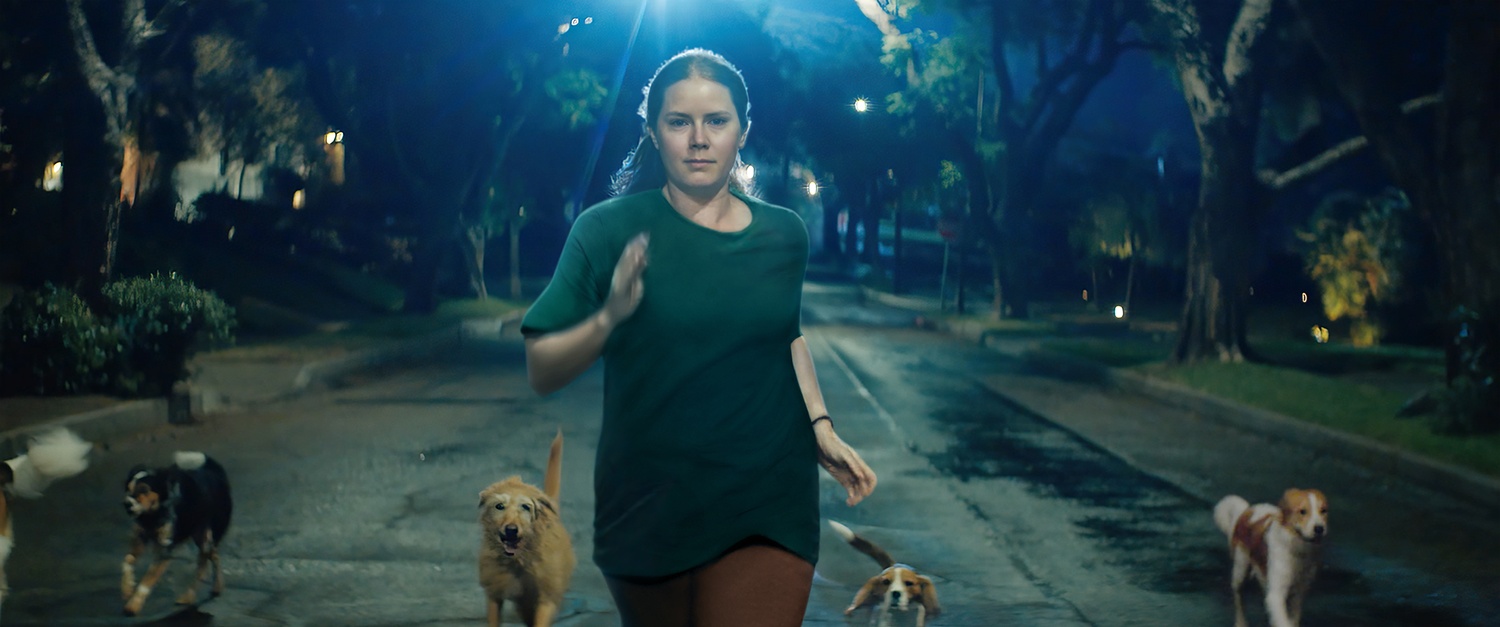
News
Summers Will Not Finish Semester of Teaching as Harvard Investigates Epstein Ties

News
Harvard College Students Report Favoring Divestment from Israel in HUA Survey

News
‘He Should Resign’: Harvard Undergrads Take Hard Line Against Summers Over Epstein Scandal

News
Harvard To Launch New Investigation Into Epstein’s Ties to Summers, Other University Affiliates

News
Harvard Students To Vote on Divestment From Israel in Inaugural HUA Election Survey
‘Nightbitch’ at IFFBoston: Empty Barks About Motherhood
Dir. Marielle Heller — 1.5 Stars

Warning: This review contains minor spoilers.
Come see six-time Oscar nominee Amy Adams take on her most daring role yet: A dog.
Based on the 2021 novel by Rachel Yoder, this adaption follows Adams as Mother, a woman who becomes increasingly exasperated by the pressures of motherhood. This frustration unleashes a primal transformation into a dog — and a cute one at that. As the title suggests, it wants its social commentary to be as daring as it is blunt. Unfortunately, the desire to achieve this goal comes at the expense of under-developing everything else in the film.
The film opens with Mother bumping into a friend in the supermarket. When her friend expresses how jealous she is of the time Mother gets to spend with her child, Mother jarringly launches into an expansive monologue about the burdens that gender roles and society place on mothers. As the opening credits roll, audiences are drawn into Mother’s world: She makes breakfast, walks her child, goes to the park, plays with toys, and struggles to sleep. These actions repeat, repeat, and repeat. Right at the beginning, there is a cumulative anxiety as the noise of domestic life starts sounding like knives that cut deep into Mother’s sense of self.
Her husband — similarly named Husband (Scoot Nairy)— has an unnamed job that requires him to take week long business trips. His absence makes motherhood a full-time job and even when he’s home, his presence is unhelpful as he plays video games late into the night.
The film does an excellent job immersing viewers in Mother’s separation from her individuality as she is increasingly bound to her irritating and irresistibly cute son. Even the sound of his coos as she tries to sleep is enough to become a shared vexation for the audience. Dynamics begin to shift when Mother’s sense of smell becomes suspiciously acute, random dogs at the park approach her, and hair and nipples start to grow in odd places on her body. Soon enough, she’s a liberated dog basking in the expansiveness of monotonous suburban streets.
Adams brings subtlety to a script that lacks it, yet she is able to convey Mother’s unraveling psyche in every glance, smile, and tiresome cry. Since Amy Adams is a mother herself, she can brilliantly traverse into emotions that easily become taboo when associated with motherhood. Regret, disappointment, and unbridled anger. Motherhood is both a universal responsibility and a unique experience, Adams manages to convey both by cathartically accessing the anxieties of the experience that she can personally relate to. She also oscillates into her comedic side — delivering macabre and off-putting jokes that only accentuate the film’s broader themes on motherhood. The comedy of “Nightbitch” is thematically appropriate, as the dark humor works as a coping mechanism to Mother’s visceral experience of motherhood. However, the rest of the cast fails to find the same beats of humor when the writing sounds more like a late-night Hollywood comedy.
The film’s wacky premise is also delivered with masterful bravado, especially in scenes where Adams tows the line between pretending to be a dog for fun with her son and then passionately succumbing to her newfound canine instincts. These scenes perfectly merge the absurdity and human aspects of Mother’s transformation. However, for those hoping for squeamish body horror in Mother’s transformation, this adaptation leaves much to be desired. “Nightbitch” doesn’t lean into the novel’s obscurity in any cinematic form. The practical effects are minimal, the cinematography feels flat and formulaic, and the color palette lacks the vibrancy expected from a story as bizarre as this. “Nightbitch” never uses the opportunity to fully commit to its absurdity and the bland visuals simply emphasize the lackluster direction applied to such a potent story.
While films like “The Babadook” use allegorical horror to convey the self-sacrifices and anxieties that come with motherhood, “Nightbitch” struggles to let its metaphor breathe, leaning instead on heavy-handed commentary. Moments from the script that do deliver depth to the narrative — such as “a child’s first act of violence is against the mother that birthed them” — are delivered with sincerity. However, similar sentiments are recycled so often throughout the film that their thematic effect is diluted. “Nightbitch” addresses the social abandonment of the “it takes a village” philosophy, unpaid maternity leave, the expected hard labor of domestic chores, and the ethics of regretting motherhood. All of these points had the potential to incite nuanced conversations among the characters and the audience, but instead they read as a thematic checklist that the director simply wished to mention rather than explore.
Mother’s primal transformation tries to symbolize a kind of rebirth, a blending of one’s pre-and post-motherhood identities. Unfortunately this allegory is ultimately gimmicky as the heavy narration scrambles any potential silences that could allow for audience interpretation.
These flaws then raise the question: Why use allegory when there is no room left for ambiguity?
“Nightbitch” is a humorous watch that points toward nuanced conversations about motherhood but refuses to fully explore them. At best, it’s a gentle reminder to appreciate your mother's love and care. At worst it’s a shallow depiction of motherhood, redeemed only by its concept and Amy Adams’s committed performance.
—Staff writer Kai C. W. Lewis can be reached at kai.lewis@thecrimson.com.
Want to keep up with breaking news? Subscribe to our email newsletter.
